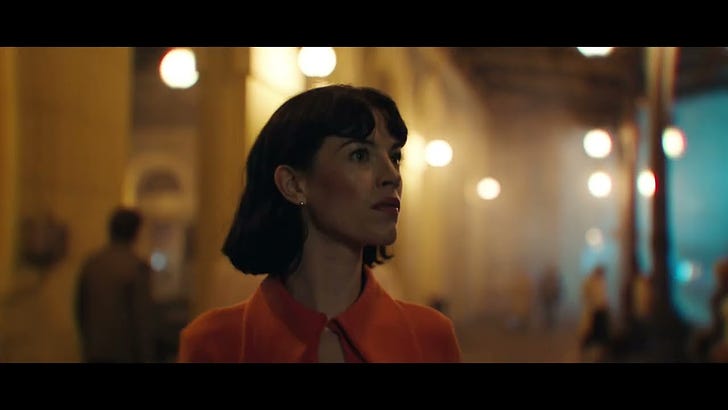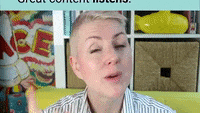🍱 Magnum on my mind; Content for the times; Big Think helps you shine
We have only one match, but we can make an explosion
Hello and welcome back to The Marketing Kable, where I'm taking you along on my journey to discover ideas, voices and campaigns that can inspire us.
something to watch
real>virtual. Would you live in a world where you couldn't have ice cream?
A delicious commercial by Magnum reminds us that as enticing as the virtual wonders of the Metaverse may be, you can't bite into a Magnum Classic ice cream. What's the point of life without icecream?
This campaign effectively illustrates how marketers can hitch their wagon to ongoing public discourse, even if it's not directly connected to their product, and leverage these conversations to generate and sustain interest in their brands.
I was even more intrigued to find that Magnum didn't stop there.
They've conducted some interesting studies on young people and the struggles we face when it comes to balancing our online and offline lives. Teaming up with neuroscientist, Dr. Jack Lewis, they’ve created the Magnum Pleasure Guide - a fount of tips to help people live their most pleasurable life, whether real or virtual.
Magnum also has made its own virtual reality goggles! In the metaverse, these goggles encourage you to take a break from your screens for 10 minutes and enjoy some real-life Magnum pleasure that you can only get in the physical world. To sweeten the deal, they've even thrown in some discount codes.
All in all, the campaign stands out for taking a generic idea (there are some pleasures the virtual world simply cannot offer) and delivering its message innovatively by actually doing some good (virtual reality goggles that encourage you to ditch screens). I'm really going to remember this one.
something to read
bet on your content. It's the fifth month of the year. Time doesn't fly, it.. evaporates! Not the best time for one of those "watch out for these trends in 2023" types of articles, but this piece by Andy Betts on Search Engine Journal stopped me in my tracks.
In the article, Betts explains 10 content marketing trends that should guide marketing strategies this year. I've picked my top 2
Create content for the human reader. Pretty obvious, but more often than not, we get caught up in the SEO of it all. We write for machines and algorithms instead of fellow humans. It's something Karina has always said to me whenever I struggle with SEO writing (which is every time I try SEO writing). It's something that bears repeating again and again until we stop churning out bland, monotonous keyword-crazy content that's not helpful for anyone.
Bett advocates for "creativity, new formats, research, and unique approaches" to generate content that can differentiate itself from all that is blah in the Internet ocean.
Quality over quantity. Another obvious sameguy. But with the rise of ChatGPT, it's easier than ever to crank out a load of content without much effort. Every Thomas, Richard and Harrold can claim to be a content marketer or a Linkedin intellectual by virtue of typing in a writing prompt.
To focus on quality, Bett recommends automating technical and miscellaneous drudgery that leech time and dedicate ourselves to:
experimenting with various content formats, such as blogs or videos, to determine which resonates best with our audience.
tracking more than just website traffic when evaluating content performance. Pay attention to engagement and conversions because they provide priceless insights into readers’ preferences.
something to listen to
axe assumptions, crank up creativity. If you've been reading TMK you'll know that I'm interested in the neuroscience behind a variety of human feelings and states of being. I'm often reading articles or watching videos where neuroscientists talk about the ways in which our brains work in certain situations and how a deeper understanding of these ways can lead to well-rounded marketing strategies.
(I also recommend exploring neuroscientific analyses of how pain and loss affect your brain. If you've just had a rough break-up or found out that your latest crush is a Sanghi or had to cancel a holiday because of your whimsical boss etc. Thank me later)
Lately, I've been looking into the neuroscience of creativity. I don't have any aptitude for science, so it's crucial that the content I find doesn't require me to understand the brain beyond a third-grade level.
On Big Think, Professor Beau Lotto talks about creativity in the context of assumptions.
The brain evolved to avoid uncertainty, and our assumptions are essential for our survival. But assumptions can also get in the way of seeing things differently.
To see differently, it is important to first accept that everything we do is grounded in our assumptions, then identify and question these assumptions. The brain only makes small steps in its ideas based on its history of assumptions, and the space of possibility is limited by these assumptions.
Creativity seems to involve linking two things that are far apart. For the person being creative, they take a logical next step based on their space of possibility, which is different from that of the observer.
As marketers, what lessons can we take away from Lotto?
Ambiguity is stressful. When we're not sure about something, it can be really painful. So, if we're trying to sell something, it's super important to make people feel safe and comfortable. We can do this by talking about things that make our product predictable and easy to control. Or, we can use language that sounds familiar and trustworthy.
Go beyond the obvious. Think outside the box. We shouldn't be afraid to challenge what we think we know about our customers. By exploring different ideas and considering other points of view, we might come up with some really novel ways to get our message across.
The Marketing Kable is where I diligently document my quest for Marketing genius. If you happened to stumble upon this newsletter because someone sent it to you, please make my day by signing up.



